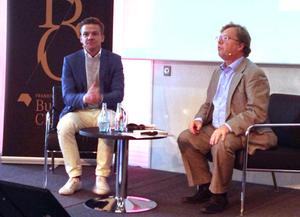 "Compared to other media businesses, the book business is in a really good place," said Jacob Dalborg, CEO of Bonnier Books, yesterday afternoon during the Frankfurt Book Fair's annual CEO Talk. Dalborg, who has been chief executive of the Swedish publishing group since 2014, was in conversation with publishing consultant Rüdiger Wischenbart and discussed Bonnier's growth in the U.K. and U.S. markets, differences between print and digital and the potential for future consolidation in the book industry.
"Compared to other media businesses, the book business is in a really good place," said Jacob Dalborg, CEO of Bonnier Books, yesterday afternoon during the Frankfurt Book Fair's annual CEO Talk. Dalborg, who has been chief executive of the Swedish publishing group since 2014, was in conversation with publishing consultant Rüdiger Wischenbart and discussed Bonnier's growth in the U.K. and U.S. markets, differences between print and digital and the potential for future consolidation in the book industry.
"We have business models that work when it comes to both physical and digital; there are readers ready to pay for literature," continued Dalborg. "If you compare that to newspaper or magazines or even television now, they're going through even bigger changes than we ever had.... It's not that I'm saying it's a walk in the park--we have to do a lot of changes, but the core of what we do, the publishing, the editing, the literature itself, there's a demand for it and people are ready to pay for it."
 |
|
| Jacob Dalborg (l.) in coversation with Rüdiger Wischenbart | |
Besides important publishing operations across Scandinavia, Bonnier has a strong presence in Germany, where it owns Berlin Verlag, Carlsen Verlag, Ullstein Buchverlage and other publishers.
Bonnier's U.K. division, Bonnier Publishing, has seen rapid growth in the last few years fueled by both acquisitions of smaller publishers and publishing bestsellers of its own. When asked about this sudden growth, Dalborg said that he did not actually think it was so sudden, as Bonnier has been establishing itself in the U.K. market since the 1990s. He suggested that it was more of a question of recognition by the publishing industry at large, rather than any change in focus or increased ambition regarding English-language markets on the part of Bonnier.
"I think we've had the focus all the time. But we've all of a sudden had recognition out in the marketplace," Dalborg contended. "We've been focusing on building this, it goes a bit slow in the beginning, then after a while becomes bigger and bigger. It is getting the bits and pieces together, getting the platform together, then when we felt we had that, we added new things on."
Asked about the differences between the types of books Bonnier publishes in the U.K. and what it publishes in its home territory of the Nordic countries, Dalborg acknowledged that there is more of a focus in the U.K on mass market books and children's books. The company's U.K. business began with mass market children's books, and since then Bonnier has been growing by "putting on the next age group." On whether Bonnier Publishing will begin publishing more adult, literary titles, Dalborg said: "Wait a couple of years and we'll see what we say then."
As for the U.S. market, in August the company officially created Bonnier Publishing USA, which includes children's publisher Little Bee Books, founded in 2014, and Weldon Owen. Though Dalborg is hopeful that Bonnier will publish adult books in the U.S. sometime in the future, he doesn't think it would be "the nearest future." For the time being, Bonnier will work to build up its children's business. When asked what attracted Bonnier to the U.S. market, Dalborg replied drily: "The U.S. market is a little bigger than Finnish or Norwegian, it was kind of interesting in that sense."
Dalborg said that he doesn't see Bonnier's digital book efforts and its physical book efforts as different businesses and, in fact, doesn't even see e-books themselves as particularly disruptive. Instead, he sees it as selling the same thing in a different distribution channel. He explained: "What we have is, we sell stories. Then if we sell them in digital format or hardcover format or audio, it doesn't really matter as long as there is a buyer for it or a reader ready to pay for it."
On the topic of future consolidation within the book industry, Dalborg said that one can expect to see consolidation in any mature market, adding that he "definitely believes" that the industry will see more of it. He was not particularly concerned about negative effects of consolidation, though, as long as competition continues. In his view, the worst place to be for a publisher is "stuck in the middle," neither small and niche nor big enough to benefit from with scale and cost efficiencies. He also argued that to most consumers, publishers are probably invisible. No reader goes into a bookstore looking to buy a book from a particular publisher, Dalborg asserted. "They look to buy an author."
Later, Dalborg was asked by an audience member what he thought of the most recent winner of the Nobel Prize in Literature. Dalborg answered: "On Bob Dylan, I think it is sad that it isn't a Nobel Prize winner where the bookshops and booksellers can sell a lot of books." --Alex Mutter

